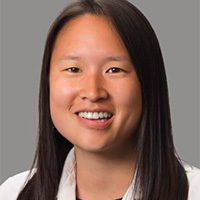AHA FIT Newsletter
FIT Spotlight

Teresa Wang, MD
Fellow, Cardiovascular MedicineUniversity of California, San Francisco
@teresa_wang88
Teresa Wang is the recipient of the 2019 Laennec Fellow in Training (FIT) Clinician Award at the American Heart Association’s Annual Scientific Sessions in November 2019. The Laennec Award recognizes the importance of clinical acumen, inductive analytic skills, and teaching ability in future academic cardiologists.
Describe your journey in becoming a cardiology fellow and what your specific clinical/research interests are.
My journey in becoming a cardiology fellow has been shaped by my role models and guided by ongoing mentorship. In high school, shadowed a cardiologist who first piqued my interest in the field and who has now become a close friend and mentor. Based on that experience, I pursued cardiology research in medical school and had the opportunity to work with Dr. Adrian Hernandez and Dr. Chet Patel at the Duke Clinical Research Institute, which developed my interest in advanced heart failure. I’ve continued that interest into fellowship, particularly with support from Dr. Teresa De Marco and Dr. Priscilla Hsue. These types of mentors at each stage of training have been integral in my career development, personal and professional growth, and navigating work-life balance (or integration). As a result, I will be pursuing advanced heart failure/transplant fellowship next year with a special interest in understanding genetic cardiomyopathies.
Briefly take us through your case that won the Laennec Fellow in Training Clinician Award.
Our case described a middle-aged female who presented as a referral to UCSF Pulmonary Hypertension Clinic for both right and left-sided heart failure symptoms as well as a pulmonary artery systolic pressure measured at 122 mmHg. Her prior imaging leading up to the clinic visit reported high probability of chronic thromboembolic pulmonary hypertension based on ventilation-perfusion and CT scans. While her physical exam did have findings of pulmonary hypertension (namely an accentuated A2), it also revealed numerous vascular bruits throughout her neck, chest, and abdomen. Multimodality imaging showed sequelae of large vessel vasculitis with severe stenoses and beaded appearance of the great vessels, and a striking tapering of the descending aorta down to 1cm. On further questioning, the patient had endorsed a systemic illness as a teenager that was likely a manifestation of acute phase Takayasu Arteritis (TA). Based on a PET scan with no ongoing active inflammation, she was diagnosed with "burned-out" TA with pulmonary artery involvement leading to severe pulmonary hypertension (Group II with left heart disease secondary to central aortic hypertension, Group IV with pulmonary artery obstruction due to arteritis leading to abnormal perfusion in VQ scan, and Group III due to untreated chronic hypoxia-induced pulmonary arterial vasculopathy).
How often has TA with PH been described and how does this case impact future clinical practice?
After the first description of Takayasu Arteritis in 1908, there have been several case series describing Takayasu arteritis with pulmonary artery involvement in as many as 66% of patients, of whom approximately 12-14% go on to develop pulmonary hypertension. These patients will often have symptoms of dyspnea, lower extremity edema, and/or respiratory failure. Therefore, in patients with Takayasu arteritis and any of the above symptoms or treatment-resistant disease, early screening of pulmonary artery involvement will allow for efforts to prevent development of pulmonary hypertension.
How will winning the Laennec FIT Clinician Award potentially play a role in your next steps/future goals?
Preparing for the Laennec award and presenting at the American Heart Association conference was an incredible learning experience. In addition to gaining experience in scientific writing and in trying to make a concise yet comprehensive oral presentation, I valued the opportunity to meet members of the Laennec Committee and the Council on Clinical Cardiology. As I look towards my fellowship year in Advanced Heart Failure/Transplant and beyond, I hope to get more involved in the AHA as a FIT and in the future in my early career.
What advice would you give to other FIT thinking about this particular award?
My advice would be to go for it! As fellows, there are many case conferences or fellows reports that we prepare as part of our training to help synthesize patient cases (in both real-time and after diagnosis). This process of summarizing information, creating a differential diagnosis, and incorporating new information is the essence of the Laennec case competition. It is also a process that we subconsciously perform in everyday clinical practice, and with some extra effort, many of these cases would be excellent for the Laennec award.
Four Days. Global Experts. Limitless Discovery.
Scientific Sessions 2026
November 6–9, 2026
Chicago, Illinois
AHA26 is the global stage for breakthrough cardiovascular science, uniting experts, innovators, and future leader for four immersive days of discovery and collaboration.
